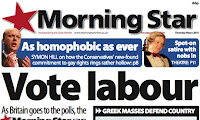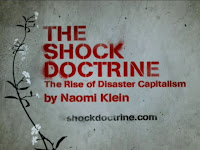 This week I got in a bit of a political ding-dong with infamous blogger Guido Fawkes on Twitter. The exchange was inspired by this Tweet from Fawkes:
This week I got in a bit of a political ding-dong with infamous blogger Guido Fawkes on Twitter. The exchange was inspired by this Tweet from Fawkes:Time for a democratic uprising for freedom in Chavez's Venezuela, get two dictators for the price of one.Fawkes' reactionary utterance was in reference to Libya's Colonel Gaddafi and the assertion by William Hague that Gaddafi had fled to Venezuela. Although Fawkes is a chronic sensationalist, his narrow-minded and ill-informed attitude mirrors the mainstream Western media.
On Monday Foreign Secretary William Hague told a meeting of EU foreign ministers that he had information suggesting Gaddafi was heading to Venezuela and this was parroted – as fact – by the BBC and other mainstream news outlets. The obvious implication was that Hugo Chavez may not be killing his own people, but he was willing to collude with and harbour tyrants. The bloody bastard!
It soon emerged that Hague’s declaration was completely false and that UN Secretary-General Ban Ki-moon was in fact on the phone to Gaddafi in Libya at the time Hague made his remarks. Needless to say, no apology from Hague was forthcoming and, unfortunately, this one-sided and partisan reporting on Chavez is typical within Western media.
Few international lea
 ders are derided or demonised more than Hugo Chavez. In the last few weeks we have seen Gaddafi massacring his own population, the brutal repression of popular unrest by Mubarak in Egypt and the end of autocratic rule for President Ben Ali in Tunisia. All these figures are rightly vilified by the press - but it wasn't long ago that our dear leaders were cosying up to these tyrants. So why the vitriol towards el Presidente?
ders are derided or demonised more than Hugo Chavez. In the last few weeks we have seen Gaddafi massacring his own population, the brutal repression of popular unrest by Mubarak in Egypt and the end of autocratic rule for President Ben Ali in Tunisia. All these figures are rightly vilified by the press - but it wasn't long ago that our dear leaders were cosying up to these tyrants. So why the vitriol towards el Presidente?Despite winning three Presidential elections and holding numerous referenda, Chavez is the most maligned head of state in the world and is habitually characterised as a dictator in Western discourse. He is always described using negative adjectives, from the mild – such as ‘controversial’ or ‘outspoken’ – to the extreme – such as ‘tyrant’ or 'authoritarian'. This relentless barrage of ill-founded rhetoric creates a critical mass of public opinion which frames Chavez as an anti-democratic demagogue. Fawkes’ comment is just one symptom of this pervasive culture. The media has a privileged and respected position in the West but, by perpetuating these myths, it is acting irresponsibly as a tool of the elite.
Commandante Chavez has put democracy at the heart of the Bolivarian project in Venezuela. His first major act as President was to replace a constitution written by elites with one written by the people. Furthermore, by nationalizing the oil industry, Venezuela has been able to eradicate illiteracy, provide free healthcare, education, pensions and various social programs. Promoting community activism, educating your down-trodden populace and holding frequent elections is hardly the work of a totalitarian despot.
The explanation for Chavez’s demonisation lies in the fact that he is profoundly democratic and has sought to challenge the concentration of wealth in the hands of an elite. He has been an influential member of OPEC; criticised U.S foreign policy in the Middle East; denied the U.S. access to Venezuelan airspace; strengthened relations with Cuba; opposed the neo-liberal Washington Consensus; empowered the people and – perhaps most importantly – has the audacity to control the largest oil reserves outside the Middle East. In helping constitute ALBA – the Bolivarian Alliance for the Americas – Venezuela is challenging neo-liberal hegemony and is providing a real alternative to international bodies such as the IMF and World Bank which seek to promote free trade.
Before accusing Chavez of being a dictator and protecting despots, the media should ask who has supported and backed these violent oligarchs in the past. Was it Hugo Chavez that sold Gaddafi weapons to slaughter his own people, or was it Britain and America? Before the media questions Chavez’s democratic legitimacy, they should look at the reality of life in Venezuela and reflect on the democratic legitimacy of the coalition government. For instance, why isn’t the media asking what mandate the government has for dismantling the welfare state? Where did that appear in the manifestos of either the Liberal Democrats or the Tories?
The West is right to view Chavez as a threat – but only as a threat to elite rule. What Chavez is showing us – and what the people of the Middle East have shown us over the past few weeks – is that another world is possible.







